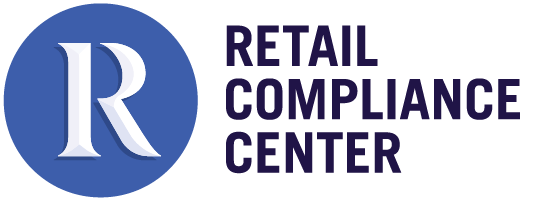Extended Producer Responsibility for Retail
Extended Producer Responsibility (EPR) is an important policy tool for managing and reducing the increasing amount of consumer waste from products, packaging and printing paper. As the term suggests, the concept of EPR is to make product manufacturers and distributors (i.e., producers) responsible for these products and materials at the end of life. For retailers, this comes into play when they have private brands. In addition, when a producer doesn’t operate in a jurisdiction, the responsibility often falls to the importer, which can also be the retailer.
EPR is intended to incentivize producers to prevent waste at the source, promote more circular design and establish public-private partnerships to help address waste program challenges by imbedding the cost of end-of-life management into the upfront cost of the item. Typically, EPR laws require product manufacturers and distributors to develop a producer responsibility organization (PRO) that manages fees paid by producers to help with the take-back of products, educate consumers on their responsibilities, and is responsible for meeting EPR targets and goals. The program fees paid by producers can vary based on the EPR program, but may come in the form of:
-
A flat fee, meaning a fixed charge applied to all forms regardless of their attributes (e.g., lower-impact materials like recycled content, higher recyclability, etc.). This is the least common structure for packaging and paper EPR legislation but is more common for product (mattress, batteries, e-waste etc.) EPR since there is typically low variation in attributes.
-
An eco-modulated fee, meaning fees would be lower for packaging or products with positive environmental attributes (e.g., recycled content and/or higher recyclability) and higher for packaging or products with negative environmental attributes (e.g., low recyclability and/or recycling rates). This is what we see most U.S. states propose for packaging and paper EPR and increasingly the go-to model in Europe but given that the four enacted programs in the U.S. have yet to be implemented, evidence from this approach will not be known for several years.
-
A fee based on market infrastructure, where fees would be determined by a weight-based (cents per pound), per-material methodology based on the real collection and processing cost of respective materials to the jurisdiction’s recycling system. Some packaging and paper EPR programs in Canada use this model.
This page highlights existing and potential types of EPR for different materials in the US including potential retailer responsibilities and associated resources.
Featured Resources
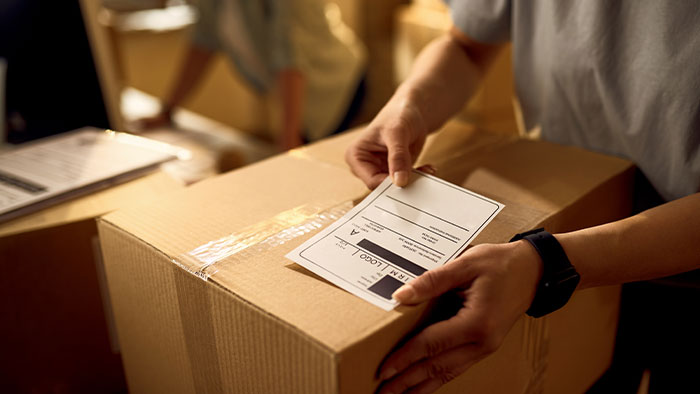
Packaging EPR State Implementation
Information on retailer responsibilities and fees as well as the implementation timeline for states with passed packaging and printing EPR
Learn More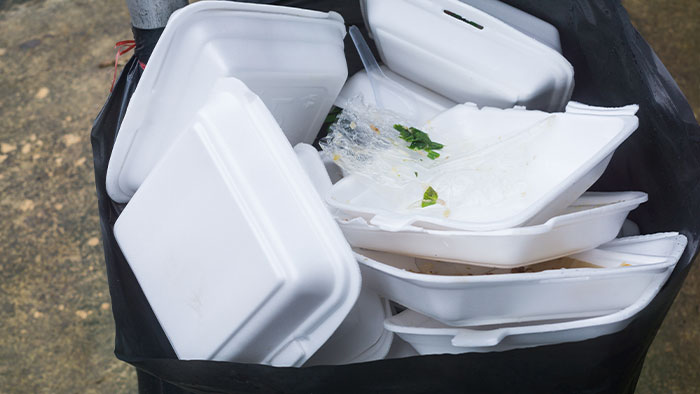
Single-Use Plastic Packaging Reduction Laws
Summary of state-level single-use plastic packaging restrictions across the U.S.
Learn More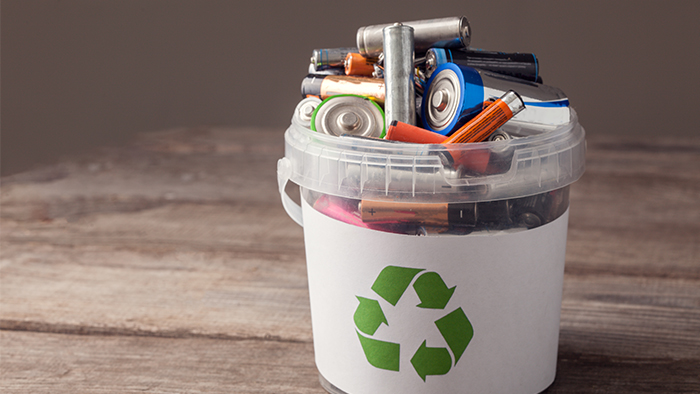
Product Stewardship & EPR Matrix
Summary of state product bans, EPR and product stewardship legislation for packaging and products such as carpet, batteries, electronics, paint and more.
Learn MoreSPC’s Guide to EPR Proposals
Make sense of packaging EPR bills by breaking down key elements of proposed policy
Learn More
Packaging and Paper
California, Colorado, Maine and Oregon have all enacted legislation for packaging and printing paper EPR. As of April 2023, EPR bills are being considered in over 15 states. These bills establish EPR program requirements for producers of packaging material sold, offered for sale or distributed in the respective state, including through an online transaction. Many of the bills under consideration include printed paper and/or paper products, while some have also included a range of single-use products such as straws, utensils, cups, plates and plastic bags. In most bills, producers are also required to join a PRO and pay some form of a fee to the PRO to help with collection, education and implementation of EPR goals. For more information on retailer responsibilities and fees as well as the implementation timeline for states with passed packaging and printing EPR click here. For a detailed list of recently introduced EPR packaging legislation and their varying components, visit SPC's Guide to EPR Proposal.
RILA Engagement
As packaging EPR legislation takes shape in numerous states, RILA continues to engage with members, stakeholders and other trade organizations to ensure the impact on retail is considered and to avoid unintended consequences stemming from a patchwork of laws around the country. To date, RILA has engaged with The Recycling Partnership’s Policy Accelerator , Recycling Infrastructure Now Coalition (RIN), Recycling Leadership Council, Retail Council of Canada and several State Retail Associations (SRAs). RILA also created a member Waste Policy Group to review packaging EPR policies and determine key industry considerations as needed (please reach out to Susan Kirsch if your company would like to engage).
Several of RILA’s member committees (i.e., Consumer Products Committee, Environmental Advocacy Committee, Environmental Compliance Network, Sustainability Committee, and Zero Waste Network) also regularly discuss and benchmark around the implementation and retailer impact of EPR on calls and via webinars. Reach out to us to learn more about past discussions and webinars.
Resources
RILA developed a Retail EPR Viewpoint that summarizes key industry considerations for product packaging fee policies. RILA retail members can reach out to Susan Kirsch to request a copy of the document.
Related Packaging EPR Resources
Packaging EPR State Implementation
Information on retailer responsibilities and fees as well as the implementation timeline for states with passed packaging and printing EPR
Read MoreSingle-Use Plastic Packaging Reduction Laws
Summary of state-level single-use plastic packaging restrictions across the U.S.
Read MoreRetail Waste Targets Tracker
Detailed tracker of retail companies with waste, recycling and packaging goals.
Read MoreConsumer Bag Legislation Summary Matrix
Summary of consumer bag legislation by state and local jurisdictions, including bans, fees, and specifications for different kinds of allowable bags.
Read MoreMandatory Recycling and Disposal Bans Fact Sheet
Overview of state-level recycling regulations and commonly recycled materials such as paper, plastic, metal and glass.
Read MoreBeverage Container Deposit Legislation
Summary of state bottle deposit return legislation in the U.S.
Read More
Several organizations have created their own framework or industry viewpoint on packaging EPR. Below is a list of current organizations working on this topic. Viewpoints in these documents do not necessarily reflect those of RILA or its individual members and should be viewed for informational purposes only.
- AMERIPEN (May 2020): Financing Principles and Objectives for Advancing Packaging Recycling in the U.S.
- Consumer Goods Forum Whitepaper (Aug. 2020): Building a Circular Economy for Packaging: A View from the Consumer Goods Industry on Optimal EPR
- Ellen MacArthur Foundation (June 2021): Extended Producer Responsibility: A Necessary Part of the Solution to Packaging Waste and Pollution
- The Recycling Leadership Council (Feb. 2021): Blueprint for America’s Recycling System
- The Recycling Partnership (March 2022): Guidance for Producer Funded Recycling Collection Legislation
- The Recycling Partnership Circular Economy Accelerator Whitepaper (Sept. 2020): Accelerating Recycling: Policy to Unlock Supply for the Circular Economy
- Product Stewardship Institute (PSI) and Flexible Packaging Association (Dec. 2020): Shared Elements of EPR Legislation for Packaging and Paper Products (PPP)
- Sustainable Packaging Coalition (July 2021): Guide to EPR Proposals
- UL and Retail Council of Canada Packaging EPR Whitepaper (Oct. 2020): Trends in Packaging Extended Producer Responsibility (EPR) – A Retailer’s Perspective
E-waste
Twenty-five states have enacted legislation mandating e-waste recycling. All laws except California and Utah use the Producer Responsibility approach, where manufacturers must pay for recycling. In California, an advance recovery fee is in place, meaning the consumer pays a nonrefundable recycling fee upon purchase of electronics. In Utah, the state has passed a manufacturer education law, where manufacturers must implement a collection, reuse, or recycling system for electronics from Utah consumers. For more information on state e-waste programs visit the below e-waste matrix.
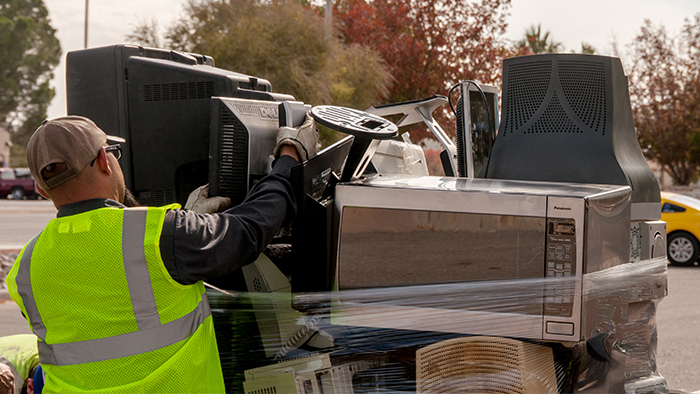
eWaste Matrix
Compliance matrix that provides a detailed overview of legislation across the U.S. that requires retailers to manage waste electronic products.
View Matrix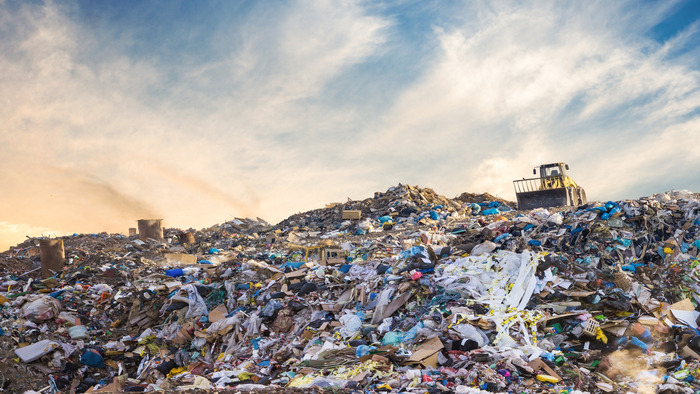
Product Stewardship & EPR
Download MatrixPaint
Ten states including Colorado, Oregon, Minnesota and the District of Columbia have enacted paint EPR laws. These laws require paint companies to develop and manage paint stewardship programs, make it easy for consumers to recycle unused paint and relieve much of local governments’ financial burden. Under paint EPR laws, consumers pay a small “eco fee” for recycling when they purchase new paint. An industry-run non-profit, PaintCare, uses this sustainable funding to manage the leftover paint. For more information on state paint EPR legislation view above product stewardship matrix.
Carpet
Currently California is the only state that has an EPR law for carpet. Under this law, carpet manufacturers (either individually or through their stewardship organization) design and implement their own stewardship program, which is funded by a visible fee that consumers pay at the point of sale. There has been an increase in states that have introduced carpet EPR legislation, such as in Minnesota, New York, and Oregon.
Mattresses
California, Connecticut, Oregon, Rhode Island currently have EPR laws for mattresses. These laws require mattress manufacturers to provide consumers with an easier way to dispose of old mattresses. Producers pay into a stewardship organization to increase the collection and recycling of mattresses. The industry created the Mattress Recycling Council to help operate programs in states with these laws. Other states like Massachusetts, Minnesota and Oregon have recently introduced mattress EPR legislation.
Textiles
Currently there are no introduced or enacted EPR laws for textiles in the U.S. Some cities, like New York City, have expanded residential textile recycling programs, and provide drop-off bins and locations for residents.
Looking abroad, France has enacted the first textiles EPR law, and programs are under consideration in Sweden and the Netherlands. In France, the companies are responsible for providing or managing the recycling of their clothing, home textiles and footwear at the end of life. Companies that produce and/or sell these textiles can create their own stewardship organization or pay into Eco TLC to help with management of their textiles. Fees are considered eco-modulated, so the more environmentally sustainable an item, the lower the contribution. Smaller companies who meet certain requirements have the option to pay a flat rate per year.
A Global Lens
The term EPR originated in the European Union (EU), which has an extensive history with EPR programs. The EU has EPR systems in place for packaging and goods such as electronics, batteries, and cars. In recent years, the EU has pushed for eco-modulation to tie manufacturer costs for EPR programs to recyclability or recycled content in packaging. This push is in hopes of reaching the EU’s goal of making 70% of packaging recyclable by 2030. The EU is looking to harmonize rules that vary within its member countries and maximize the impact of EPR, including eco-modulated fees, to help boost efforts to reach this packaging goal.
Many non-governmental organizations are promoting and/or researching EPR related solutions. Leading European-based organizations, including the Ellen MacArthur Foundation and the Consumer Goods Forum have developed numerous resources laying out criteria for an optimal EPR program.
Canada also has EPR systems in place for certain products such as batteries, electronics, beverage containers, paint and recently paper and packaging. Unlike the EU, Canada looped printer paper and packaging into one EPR system, as incorporating paper often leads into higher recovery rates. Five provinces in Canada currently have paper and packaging programs that are funded through EPR. The Retail Council of Canada and UL published a whitepaper in 2021 on packaging EPR that provides a retailer perspective on EPR implementation in Canada.
Interested in learning more? Reach out to Susan Kirsch to learn how RILA is facilitating retail industry discussions and engaging key stakeholders around EPR.
Disclaimer: Viewpoints in linked documents or pages do not necessarily reflect those of RILA and should be viewed for informational purposes only. The information above is meant to be a reference tool and is not an exhaustive list of all EPR legislative activity in the U.S. The information provides a summary and does not convey all aspects of legislated requirements. Links to legislation are accurate as of the date of this publication. Retailers should reference official agency resources and/or the appropriate legislative documents for comprehensive guidance. Inclusion of introduced legislation is not a predictor or an indicator of RILA’s belief that it will pass.
